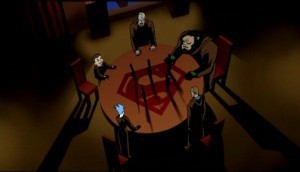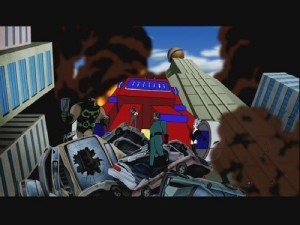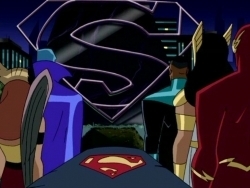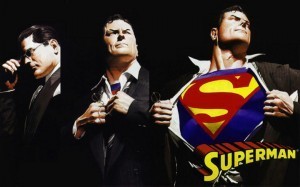Joshua Unruh's Blog, page 11
March 27, 2012
I Have No Idea What The Hell I’m Doing (An Ode To Myself)

I'm a husband who supports his wife's general badassery. That's why I thought her playing roller derby was an awesome idea even though it was going to mean a LOT of practice. Then she cemented her badassery in an unexpected way...by breaking her arm at practice. It's made her very popular. Apparently, in derby, making your bones is breaking your bones.
I'm a parent of a son and a foster parent of another. I can't talk a lot about the latter, but that's why sometimes I sound like I only have one kid and other times I sound like I have more. First one then the other got sick and leaked from both ends. This happened not long after the Senior Partner broke her arm. She wasn't really able to help with them. I swam in the effluvia of others and barely left the house for fifteen days.
I'm a massively extroverted person who didn't leave his house much or get to talk to very many people that were over the age of four for nearly fifteen days. This was depressing enough that it made me not want to talk to people or get out of the house. Yes, I see the irony just fine, thank you.
I'm a huge superhero comic book fan but I'm pretty sure the Big Two publishers don't really want me as a customer anymore. This means I can either get curmudgeonly about it or just divest myself of 99% of the enterprise. I'm still riding that ragged edge.
I'm a writer who hasn't really written much of anything in the last month or so. Initially this was to recharge the creative batteries, but somewhere along the line it became about taking care of sick kids and playing Skyrim.
I don't really enjoy most video games but I am hours and hours into Skyrim and plan to play it again when I'm done, only then as as a very self-interested, possibly evil magus.
I'm a published author, but I decided at almost the last minute that a not-quite finished NaNoWriMo novel should be the one I published two months later. What's more, I sorta want to play in another sandbox, but the sequel comes out in July. Man, I should probably start working on that thing...
This is the 100th post on a blog that keeps getting repeatedly neglected because I'm not entirely sure what to do with it. Scholarly comic book nerdery? Daddy blogging? Excerpts from things I'm working on? Comedy? Rap lyrics (my own or others)? General musings?
So apparently I have no idea what I'm doing in any part of my life. At least I'm consistent.
I Have No Idea What The Hell I'm Doing (An Ode To Myself)

I'm a husband who supports his wife's general badassery. That's why I thought her playing roller derby was an awesome idea even though it was going to mean a LOT of practice. Then she cemented her badassery in an unexpected way...by breaking her arm at practice. It's made her very popular. Apparently, in derby, making your bones is breaking your bones.
I'm a parent of a son and a foster parent of another. I can't talk a lot about the latter, but that's why sometimes I sound like I only have one kid and other times I sound like I have more. First one then the other got sick and leaked from both ends. This happened not long after the Senior Partner broke her arm. She wasn't really able to help with them. I swam in the effluvia of others and barely left the house for fifteen days.
I'm a massively extroverted person who didn't leave his house much or get to talk to very many people that were over the age of four for nearly fifteen days. This was depressing enough that it made me not want to talk to people or get out of the house. Yes, I see the irony just fine, thank you.
I'm a huge superhero comic book fan but I'm pretty sure the Big Two publishers don't really want me as a customer anymore. This means I can either get curmudgeonly about it or just divest myself of 99% of the enterprise. I'm still riding that ragged edge.
I'm a writer who hasn't really written much of anything in the last month or so. Initially this was to recharge the creative batteries, but somewhere along the line it became about taking care of sick kids and playing Skyrim.
I don't really enjoy most video games but I am hours and hours into Skyrim and plan to play it again when I'm done, only then as as a very self-interested, possibly evil magus.
I'm a published author, but I decided at almost the last minute that a not-quite finished NaNoWriMo novel should be the one I published two months later. What's more, I sorta want to play in another sandbox, but the sequel comes out in July. Man, I should probably start working on that thing...
This is the 100th post on a blog that keeps getting repeatedly neglected because I'm not entirely sure what to do with it. Scholarly comic book nerdery? Daddy blogging? Excerpts from things I'm working on? Comedy? Rap lyrics (my own or others)? General musings?
So apparently I have no idea what I'm doing in any part of my life. At least I'm consistent.
March 16, 2012
Vomitorium

So my son was sick earlier this week. Throwing up, low grade fever, the whole deal. The last time he had a tummy bug was so long ago that he doesn't remember it at all. Cut him some slack, he's four, not tons of life experience to draw from. But because of this memory issue, throwing up was basically the single most traumatic thing that could have happened to him.
Think about it. You put food in their all the time. Food and juice and candy and all kinds of great stuff. It works it's way out the other end, sure, but it never, ever, EVER comes back out. That would just be...unnatural. If you try and imagine it from his POV, that's pretty scary stuff.
Anyway, the toughest part for me to watch was when he felt better the next day. He was so thirsty and a little hungry that the crackers and strawberry Pedia-Lite I gave him was like manna from heaven. They were simple and good, he wanted them, and they made him feel better.
For a couple hours.
Then it all came right back out.
And he completely didn't understand it. "But the Pedia-Lite made me feel better, daddy," he whimpered. "It was good, I liked it."
Again, you can see why he'd be confused. I gave him those things because they were good for him, I assured him they were good for him. But still, his body rejected them. And so fast that the recycled Pedia-Lite still smelled of strawberry. It was so good for him that it still smelled sorta okay even after it came back out. But now it was tainted no matter how good it smelled. It was good mixed with bad.
Slowly but surely, we experimented. Eventually, good things went in and stayed good on the inside. A week later, you'd never know his entire digestive system had been in rebellion.
Meanwhile...
So a few weeks ago, I started this short story. I was really excited to write it. It was using a character I'd had living in my head for years. And it was going to introduce an all new character that was an idea I should have had years ago. It was going to be Young Adult, like TEEN Agents, but more boy-focused. Necromancers, monsters, blowing stuff up, jet packs, the works.
But I think I jumped into it too fast after TEEN Agents. I mean, that thing went from not existing on November 1 to a polished piece of published work I couldn't be prouder of. But that kind of creative grindstone will wear down any nose. The nub I had left on my face didn't seem up to the challenge of the short story.
Thing is, I almost never have trouble with word count. I have an idea, a plot and characters, then it's just a matter of time before I get it on paper. It isn't all gold on that first draft, but the first draft gets done and relatively quickly. I had good things inside my head, it should've all worked out.
I started the damn thing five times. The first four were deleted whole cloth. Nothing from any of them made it into the opener I wound up using. The rest of it was like pulling teeth as well. Normally I look forward to my action scenes. After years and years of comics, I can see them in my head as they go. I almost never have to plan them, they happen organically as I go. But this whole thing just drug end to end. It was lethargic locution.
I wasn't ready to let it go. I kept putting good things down on the paper slowly but surely even though they were tainted with a lot of bad. I sure as hell couldn't put the mess back in and expect it to come out better. It was a hot mess, but it was eventually out of me.
I sent Ajax Stewart in Werewolves of Mass Destruction to a friend and she LOVED IT. She helped me polish it and it was submitted to a Kindle All-Stars anthology (a YA reader for worldreader.org; that's a damn good cause). La Consigliera of the KAS loves it so much she wants to make it the cornerstone of the anthology.
A week later, you wouldn't be able to tell my entire creative system had been in total rebellion.
I swear I had a point to these two stories. Ah well, I'm sure it'll come back to me.
February 27, 2012
Sometimes It's Your Job To Be The Bad Example

Lately I have found myself reading things that I do not enjoy.
I'm not a masochist, I didn't buy/borrow/check out the book because I expected to hate it. I might have heard good things. Or I might have been doing research. Or it might have simply struck my fancy. But then I start reading it and it's terrible. Or at least does things terribly.
This is when normal humans would stop reading. But I can't. I can't because I'm a writer.
Netflix Set Me Free
This finishing things that I'm not enjoying is a really foreign concept to me these days. Once upon a time, it was typical. Take movies. I had to drive somewhere to spend six bucks on a movie. I don't care if it's the worst thing I've ever seen, I am finishing that sucka.
Then Netflix came along. They were going to send movies to my mailbox,man! If I watched enough movies, then they basically cost me pennies apiece! If watched something that was crap, I stopped it, boxed it up, and mailed it back hoping to get lucky on the next pull of the movie lottery I made for myself.
Then streaming happened. Holy cats, I did't even have to wait on the US Postal Service.
I'd always been a bit like this with books, anyway. But Netflix reprogrammed my brain to consider my entertainment time to be a premium. Add kids to the mix, and entertainment time actually does become a premium.
But now I finish the books that I don't like. They just take me twice as long.
Being A Writer Is Like Giving Yourself Homework Every Night for the Rest of Your Life
I've seen the above quote often, and it's really true. I expect this to be true to some extent even after I'm being paid to write for eight hours a day. After all, I can't stop thinking, now can I?
But this thing with reading books you aren't enjoying is even worse.
I mean, look, if the book is just terrible then I can stop reading it. If it's amateur mistakes I don't make anymore, then I don't need to be reminded of them like this. But lately it seems like I'm finding things that would be good if only they'd stop doing this one stupid thing or get to the damn point faster. Or they're doing something similar to my own idea but in such a way that it ruins the idea (at least in my estimation) and I want to make sure I don't blunder into those mistakes.
My One Ray of Hope
I guess as I get continually better as a writer then more and more of those mistakes will be obvious to me. Which means if the book sucks in those particular ways then I can stop reading it.
I think I may have traded homework I really hate for homework that I enjoy doing...more or less. This might inspire me to write more words than anything else ever.
February 26, 2012
TEEN Agents Review and CONTEST!

My good friend and fellow Kindle All-Star Laurie Laliberte offered to do three amazing things for me. First, she would read TEEN Agents despite not meeting the demographic on most levels. Second, she would review the book on Amazon and Good Reads. Last, she would give many more eyes to a paperback giveaway than I could with a blog team-up!
Here's the review and later there will be rules. Check 'em out!
I'm always 100 per cent honest when I write a review. It's my nature. So, in the interest of full disclosure, I should tell you right now that Joshua Unruh is a friend of mine and that I'm already a fan of his work. Oh yeah, and I've been looking forward to the release of this first installment in the TEEN Agents series ever since Josh began writing it.
As a fan of mystery/suspense/espionage, I knew I'd enjoy The Plundered Parent Protocol, but I really didn't expect the almost comic book, just a bit over the top, downright fun adventure it would be.
Josh has taken a little bit of James Bond-type espionage, dropped it in a pot with all three of Charlie's Angels, and stirred it counter-clockwise to de-age it. The end result is something wonderful that teen and tween girls will love. And, if you're a parent who tends to read what your kids are reading so you know it's not "too much," you'll enjoy it too.
This book is refreshing, innocent, clean, fun. . .and I thought it was cramazing.
I'll let Josh tell you how you can win a signed paperback copy:
Agents, here are your rules of engagement. You'll have up to six opportunities to fulfill your mission. For each of the following, you will receive one entry:
1. Stop by Josh's blog, follow it, and leave a comment on any post except the one that describes this contest. If you're already a follower, just leave your comment.
and/or
2. Stop by Laurie's blog, Big Girl Blog, follow it, and leave a comment on any post except the one that describes this contest. If you're already a follower, just leave your comment.
and/or
3. Tweet the link to the contest with a cc to Josh @JoshuaUnruh or Laurie @LaliberteLaurie. It doesn't matter which blog you link to in your tweet. If you're not on twitter, then post on facebook or Google+.
AFTER ACTION REPORT: After you've done one or more of the above, return here and leave one comment telling us what you did. At the end of the contest, each of us will pull one name.
BONUS OBJECTIVE: If you tell both of us what you did, you double your chances of winning.
Don't forget we'll need your email so we can notify you that you've won and deliver your prize. Each of the two winners will receive an email from kindleallstars[at]gmail[dot]com explaining how to claim their prize.
The contest begins at 8:00 a.m. GMT on Sunday, February 26, 2012. (That's 3:00 a.m. on the east coast and midnight on the west coast.) It ends at 8:00 a.m. GMT on Sunday, March 4. (Again, that's 3:00 a.m. on the east coast and midnight on the west coast.
February 23, 2012
Leveraging the Anti-Hero

I mentioned in a previous post how the show Leverage on TNT has been awesoming me. I love heist and con artist movies, especially some of the most famous from the 60s heyday of the genre. I love complicated, interwoven plots. I love ensemble casts. I love dialogue that is also snappy patter. So, really, it's a no-brainer that I'd love this show.
But I don't usually love anti-heroes. I don't necessarily hate them before I get to know them, but outside of Noir fiction (wherein there aren't ever really any heroes so there can't really be an anti-hero either), I prefer protagonists I can at least not hate.
And Leverage's cast is entirely made up of anti-heroes. They're thieves of the first order who have made a living off their skills by lying, bilking, and stealing. These are not usually the people I want to hang out with for entire books or seasons.
I'm not typical, though. Americans love an anti-hero. Vigilantes and flawed do-gooders have been part and parcel of our cultural heroes since day one. The frontiersman struck a pretty heroic figure, but he was also a loner uncomfortable in society. The Old West is chock full of gunfighters, bounty hunters, gamblers, and other ne'er do wells and scofflaws that may or may not have put on a tin star with their six-shooters. The Depression was such a blow to us that even Superman started out as the kind of guy that would slap wife-beaters, slum lords, and even governors to make a point. Moving into the 70s and 80s, we loved Charles Bronson so much that even our cops were mavericks and our Army men were disgraced before they went after First Blood.
The Rich and Powerful Take What They Want...
So how can I get on the side of a whole team of anti-heroes? The creators of Leverage use the oldest trick in the book. It's a trick I've used more than once. They take a load of bad guys and then have them do terrible things to somebody who's even worse.
Every single episode has a bad guy the average viewer would love to see get taken down. Crooked music producers who steal the only thing a family has, their music. Private security firms willing to lie about hurting a soldier who can no longer care for his family. A debt collector who uses tax information to bilk people of money then funnel it to a right wing militia. A real estate company who maneuvers families into foreclosure.
As an interesting aside, I don't think this show would have worked ten or twelve years ago. There's a general feeling of unrest, of the Little Guy getting beaten down, a vibe that "we" can't really compete with big corporations who buy and sell votes as they see fit. Oil, news, politics, war, it all feels like business now. A business that crushes "us" in the gears. But not so many of us felt that way a decade ago. The pot had to simmer long enough to make a win by thieves feel like a win for all of us.
...We Steal It Back For You
And make no mistake, the heroes of Leverage are thieves. They hack into computer systems and crack safes to steal personal information, pretend to be other people to engender trust and confidence, beat guys up, and generally con the living hell out of everyone. They make no bones about it. These guys steal and they are amazing at it.
So amazing that maybe you shouldn't think too hard about how amazing they are. I mean, they didn't get that good at thieving by getting Boy Scout merit badges. They stole for years before the pilot episode gave them the means and opportunity to start down the road to redemption.
Sometimes Bad Guys Make the Best Good Guys
And that's definitely how they play it. These untrusting and untrustworthy loners forge first a team and then a sort of surrogate family rallied around the principle that you shouldn't steal from the Little Guy. Not only are they hitting the Big Guys back, but they're becoming better people while they do it.
Well, except for Nate. But then, he wasn't a thief before the pilot. Hmmm...there's something for me to chew on later...
We Provide...Leverage
An that's how they make it work for me. They're bad people who realize they're bad people trying to be better people by screwing over worse people. When I write it out like that, it's such a hodge podge of ideas that it shouldn't work on me. I mean, I'm pretty genre savvy. But they take all that, package it up in fun characters, wrap it up in slick talk and clever plans, then tie the bow of "they got theirs" around it.
That's a pretty big spoonful of sugar and it makes the medicine go down very smoothly.
February 21, 2012
More Positivity Than A Proton AND a Positron

A thing I know about myself is I tend to get more talkative and introspective about the stuff that outrages me than the stuff that makes me happy. I don't think I'm unique in this. In fact, any of you who have worked food service are right now thinking, "Yeah, you and the rest of this herd we call humanity."
Well, no longer! Or at least not for today! Today I'm going to talk about six pieces of fiction that have really got me excited lately. These are things that blew my mind with their quality, inspired me to write, or taught me lessons. Usually they did all three at once.
So, in no particular order, things that recently awesomed me!
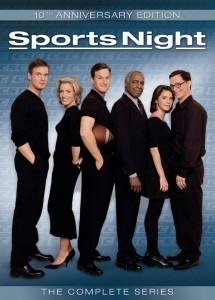 1. Sports Night - I've heard raves about Sports Night for years. It's a late 90s dramedy about a sports news show with a few obvious main characters but a sprawling secondary cast. Snappy patter, Hawksian dialogue, and genuinely funny and human characters make this a triumph from Aaron Sorkin. It makes me want to write dialogue that will be described as "Unruhesque" someday.
1. Sports Night - I've heard raves about Sports Night for years. It's a late 90s dramedy about a sports news show with a few obvious main characters but a sprawling secondary cast. Snappy patter, Hawksian dialogue, and genuinely funny and human characters make this a triumph from Aaron Sorkin. It makes me want to write dialogue that will be described as "Unruhesque" someday.
2. Terriers - My buddy Zac convinced me to watch this by describing it as "the Neo-Rockford Files." I'd heard some good things, but this clinched it for me. A recovering alcoholic ex-cop and his ex-criminal buddy work as unlicensed private detectives. The premise is that they've stumbled onto a case that's way above their heads. I know that sounds like half the PI shows that have ever been made. The magic of this one is that EVERY case, not just the big, season-long one, winds up being weirder and more complicated than originally thought. This show taught me that it's okay for your characters to do bad things for the right reasons. It also taught me that it's okay if that works for them every now and then. It also taught me how to make things difficult for main characters without undermining their inherent awesome.
3. The Absolute at Large - Who would have thought that 90 year old Czech science fiction/satire would be so relevant today? The basic idea of this novel by Karel Capek is a scientist invents a way to annihilate matter completely, thus unleashing almost infinite energy. Unfortunately, that sets loose the Absolute, the parts of God found in all matter. Naturally, God turned loose in the world causes some pretty amazing havoc. This book accidentally handed me a concept that solved a superhero idea I've been working on. It also got me to think hard about what it'll mean if I write a science fiction story.
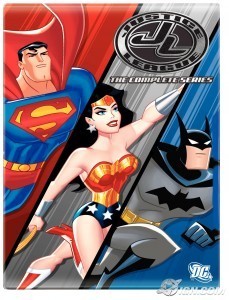 4. Justice League - I mentioned before I've been working my way back through this series. Generally, it's still amazing. But the first season of Justice League Unlimited has caused me to seriously think about the core concepts of characters. Obviously, characters that have been written for 70 years have a core concept that you don't want to try to row against. But shouldn't every main character I write be given the same kind of up front consideration? I think so and JLU s1 is showing me why things ring hollow if you don't do that initial character work.
4. Justice League - I mentioned before I've been working my way back through this series. Generally, it's still amazing. But the first season of Justice League Unlimited has caused me to seriously think about the core concepts of characters. Obviously, characters that have been written for 70 years have a core concept that you don't want to try to row against. But shouldn't every main character I write be given the same kind of up front consideration? I think so and JLU s1 is showing me why things ring hollow if you don't do that initial character work.
5. Leverage - Every 44 minutes is a modernized 60s heist/con movie. I think this show is going to spawn at least one post as I talk about our love of the anti-hero. This is a group of thieves who have turned their abilities and skills against those who stomp on the little guy. Aside from the anti-hero thing I'll talk about another time, this show has taught me that I really want to write a television show someday. It's also taught me (along with #6) that literally any genre can be updated and repackaged to appeal to a new audience while still making the audience already in the know happy.
6. Sherlock - A modern retelling of the Sherlock Holmes concept. I don't know what to say other than if you're not watching this, you're missing out. It updates and reimagines the core concept and stories of Sherlock Holmes into a thing so fresh that an entire generation of people for whom this is their first brush with Sherlock Holmes is going to wonder why somebody would do it a stuffy, Victorian version of their favorite stories. This show taught me that I was being lazy when I wrote period pieces. It showed me that updating an aging concept is so much more than just moving it into the modern day. Frankly, considering how much I appreciate period genre pieces, it showed me that, as a writer, I could be doing 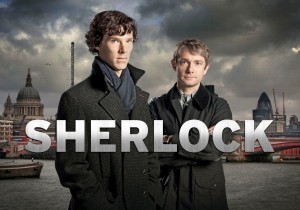 better.
better.
You'll note that's a lot of television that's inspiring me. There are several reasons for that. One is that reading is harder in a house with young children. Another is that I'm not able to get what I get from the show from the original material . The biggest reason, though, is that I've wound up reading a lot of not very good stuff lately so that I can learn what not to do as a writer.
And if you think you just read the seed of another blog post, you're right about that too.
January 31, 2012
Strong Enough for a Man, But Made for a Woman

I love Young Adult fiction. Most of the time that looks like guys in capes fighting would-be world beaters instead of boy wizards or, God deliver us, sparkly vampires.
But I'm also a lover of a wide variety of genre fiction. One of my favorites is Spy Fi, the genre best exemplified in the past by The Avengers or The Man from UNCLE and, more recently, by shows like Alias and the Middle Man. These two things, YA fiction and Spy Fi, come together in my latest novel.
TEEN Agents in The Plundered Parent Protocol is a novel about three girls, best friends, whose fathers are kidnapped by an evil genius...one who just happens to be ten years old. This is how Elly Mourning, Hea Jung Noone, and Saturday Knight discover the existence of the Teenage Extranormal Emergency Network and how they join its ranks as agents.
There's plenty of weird gadgets, exciting espionage, and plots for world domination in TEEN Agents. But at its heart, it's a story about three girls who want to save their dads but have to grow up quite a bit to do it.
Right now, I'm the father of just one kid, a little boy. He and I watch all kinds of adventure cartoons, read comic books, and I continue to take in all that genre fiction I've always loved. But now I have an eye as to when I can share it with him.
I'd also like to be the father of a little girl someday. I don't want to climb a soapbox, but it's pretty hard to find stuff to excite and empower my hypothetical little girl.
But it shouldn't be that way.
I should have as much strange and exciting genre fiction with young heroines as I have with heroes. Since I don't, I decided to do something about that.
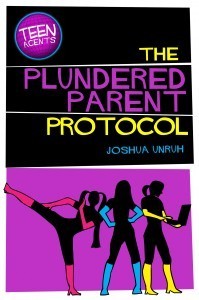 So that brings me to Elly, Hea, and Saturday. Elly is sharp and together, a born leader. Hea is a free spirit and incredibly athletic. Saturday has a brilliant scientific mind.
So that brings me to Elly, Hea, and Saturday. Elly is sharp and together, a born leader. Hea is a free spirit and incredibly athletic. Saturday has a brilliant scientific mind.
I wrote them to be the kinds of girls I'd like my future little girl to look up to. They aren't perfect, but they are as accomplished and secure in who they are as thirteen year old girls can be. And they're learning and growing as they go.
But I didn't want to write a "girl's story." I wanted to write a spy fi story that starred girls. One that would be exciting for girls...and for their brothers and dads. Which is why I can assure you that the genius is evil, the enemy agent is suave and debonair, the traps are deadly, the lairs are secret, and the plan is diabolical.
This book is for girls looking for exciting fiction that makes them feel good about being girls because it's a book about heroic girls. Not to mention it's a fun read.
I loved writing this novel for so many reasons. And my beta readers have absolutely loved reading it. I hope you can contribute something to the project. Trust me, if you enjoy reading it half as much as I enjoyed writing it, you won't be sorry you did.
Because I want everyone to give the book a look, Consortium Books has a very special offer for all you potential TEEN Agents. Today is the official "street day" and for the first 24 hours, this book will be absolutely FREE! You're just one click away from an exciting spy adventure with three of the most fun girls you'll ever meet. Give it a shot, will ya?
January 26, 2012
From the Mouths of Babes Come…Genre Conventions?

For Christmas, the Senior Partner gave me all 91 episodes of the early-to-mid 2000s Justice League cartoon. It's a great gift and I'm working my way through all the episodes in order. Even the ones I've seen a million times. Plus, I'm watching them with my 4.5 year old son. It's educational as well as entertaining.
This show is a classic example of how to do adventure storytelling right. Even though there are seven main characters, each is given opportunities to shine. They wisely chose to use two-part 22 minute episodes so they could let the stories breathe. But that also gave them the opportunity to use cliffhangers multiple twist storytelling.
I may talk more about the virtues and learning opportunities in Justice League more in the future, but right now I wanted to zero in on a particular episode and something I learned about kids and the power of genre expectation. The episode is Hereafter Parts 1 and 2. Be ye forewarned Thar Be Spoylers Ahaid.
This episode opens with a meeting of the Superman Revenge Squad. They declare vendetta against Superman, start messing up Metropolis, and the Justice League shows up to stop them. Toyman reveals a giant robot that shoots a really, really slow disintegrator beam. It's no good for hitting moving targets, but it's making things rough for the JL because of all the civilians Toyman puts in danger making bits of street and building vanish.
Frustrated at his inability to hit Superman, Toyman turns the weapon on Wonder Woman, who has been trapped motionless under some rubble. Superman rushes to her aid, takes the hit and is obliterated. The rest of the episode is devoted to various characters dealing with Superman's death.
Lois and the Kents are in tears, Lex is at a loss, the Justice League isn't sure they can go on without him, and Batman is either busy being the World's Greatest Detective, living in deep denial, or a combination of the two.
Did I mention the character work on this show is amazing?
Anyway, Superman spends all of Part 1 Act 2 and 99% of Act 3 dead. Elijah spent that entire time very concerned about Superman. I totally expected that. But the way he was concerned was eye opening. He never asked how they killed Superman or why they killed Superman.
He asked When will they bring Superman back?
Not quite five and he already has a firm grasp on genre convention, at least in the area of superheroes. I mean, c'mon, they can play with it, but we know Superman isn't going to stay "dead." When I was in high school, they killed Superman in the comics and, because of a slow newsday, the story was picked up by major news outlets.
Perfectly reasonable adults bugged the crap out of me wanting to know how DC Comics could kill off such an icon. My only answer was to look at them in shock and ask, "Do you really think Superman is going to stay dead?" (Not to mention the idea that Warner Bros. would allow the death of the most recognizable pop cultural icon in the world is ludicrous in the extreme.)
That just isn't how superhero comics and cartoons work. Heaven and Hell have revolving doors in superhero universes. People age at ridiculously slow rates. Peter Parker has aged ten or twelve years since the mid 60s. Superman and Batman have been in their mid-30s since THE 30s. Genre savvy readers get this, including kids.
There's a story about one of my favorite comic book writers, Grant Morrison, fielding Batman questions at a convention. At this point, Batman has had five Robins. The first Robin has grown up enough to be Batman himself. One of the con-goers asked "If he has had five Robins, the oldest of which is at least in his late 20s, then how old is Bruce Wayne?"
"Obviously Bruce Wayne is 70 years old," Morrison answered. "He was 'born' in 1939. He's a fictional character. He doesn't follow the same rules as we do."
Morrison went on to say that children understand this and it's only adults that fail to grasp it. Children do not watch one animated feature and immediately expect all crabs to start talking, at least not usually. They get that make-believe means the real-world rules just don't apply.
Genre is shorthand, genre is a way to group types of stories, and genre is a way to help us narrow down our vast choices of what to read. Genre helps us define our tastes. But watching this cartoon with my son gave me another use for genre.
The lesson I took from this is that genre conventions let us get a bit of that kid viewpoint back without having to admit it. If we can all agree that the rules of this genre countermand the rules of the real world in these specific ways, then I (the writer) can get on with the telling of the story I want to tell and you (the reader) can get on with reading it. We can shed the disguise of Real Life and put on the Action Suit of Story.
That's pretty powerful stuff. Maybe even more powerful than a locomotive.
January 18, 2012
F**K SOPA

See what I did up there? I censored myself.
I censored myself.
That's the important bit. Nobody else censored me, I chose to do it myself.
Chunks of the internet are going dark today, January 18. A lot of tech savvy people made their own sites go dark. I'm not that tech savvy. But I can not-post with the best of them! And that's what I did!
I started ahead of the eighteenth, though. I really did it to prove a point this time and not just because I'm lazy. You see, if SOPA (or the Senate's version, PIPA) were to pass, this blog would go away. I guarantee it.
I talk a lot about copyrighted material. I post pages from copyrighted material to prove my points. A lot of my points are that copyrighted material stands on the shoulders of non-copyrighted (and unable to be copyrighted) giants.
Big, greedy corporations that are copyright holders do not like to be reminded of this. They also don't like to see me, or anyone, even sorta playing with their toys. Even if it doesn't cost them a cent. Even if talking about it might make them money, they want to take their bat and ball and go home.
Way more qualified and informed people than me have dissected this thing, so I'm just going to highlight the title of the bill.
HR 3261 - Stop Online Piracy Act: "To promote prosperity, creativity, entrepreneurship, and innovation by combating the theft of U.S. property, and for other purposes."
I want to call this out for the monumental pile of bullshit that it is. But I can't because they put a magical clause in that title. "And for other purposes" covers more sleight of hand than "abracadabra."
I've talked about the goals of the Consortium. I've talked about how we don't plan to copyright anything because copyright does not "promote creativity, entrepreneurship, and innovation." It does promote prosperity, but only for the copyright holder. Hint, that's typically not the actual artist or creator of the work.
Even an idiot can tell that part of the bill's title is bullshit. But the magical phrase is almost the government being honest with you. "And for other purposes" pretty much covers the stuff I don't want the government to do on the internet.
If you don't get concerned when authority figures start using phrases like "and for other purposes," then you aren't paying attention. Especially when it comes to curtailing free speech.
As an artist, as an American, as a person, I am sick and tired of huge stacks of legal tender as the only motivator for monumental decisions. I'm tired of it deciding what books and newspapers I can read, I'm tired of it starting wars, I'm tired of it ruining the environment, and, last but not least, I'm tired of it buying votes.
So this is all you're getting from me today. This isn't me going dark, but it is me explaining my previous darkness. I think that counts. So here's the bottom line: SOPA and PIPA are bad for the internet. They're bad for free speech. As ironic as this is, they're bad for freedom.
Consider how we went to war a half a world away in the name of a nebulous concept of freedom while, right here at home, corporations with big bank accounts are buying very specific ones right out from under us.
The darkness is good. The darkness makes a point. But afterwards, let's light a candle.


